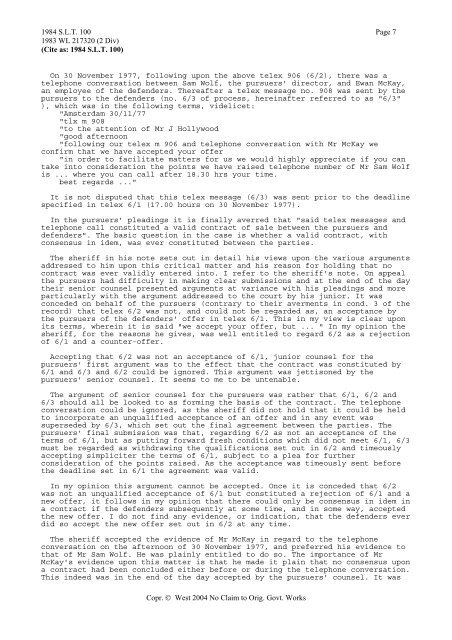Tesco v Constain - Thomson Reuters
Tesco v Constain - Thomson Reuters
Tesco v Constain - Thomson Reuters
You also want an ePaper? Increase the reach of your titles
YUMPU automatically turns print PDFs into web optimized ePapers that Google loves.
1984 S.L.T. 100 Page 71983 WL 217320 (2 Div)(Cite as: 1984 S.L.T. 100)On 30 November 1977, following upon the above telex 906 (6/2), there was atelephone conversation between Sam Wolf, the pursuers' director, and Ewan McKay,an employee of the defenders. Thereafter a telex message no. 908 was sent by thepursuers to the defenders (no. 6/3 of process, hereinafter referred to as "6/3"), which was in the following terms, videlicet:"Amsterdam 30/11/77"tlx m 908"to the attention of Mr J Hollywood"good afternoon"following our telex m 906 and telephone conversation with Mr McKay weconfirm that we have accepted your offer"in order to facilitate matters for us we would highly appreciate if you cantake into consideration the points we have raised telephone number of Mr Sam Wolfis ... where you can call after 18.30 hrs your time.best regards ..."It is not disputed that this telex message (6/3) was sent prior to the deadlinespecified in telex 6/1 (17.00 hours on 30 November 1977).In the pursuers' pleadings it is finally averred that "said telex messages andtelephone call constituted a valid contract of sale between the pursuers anddefenders". The basic question in the case is whether a valid contract, withconsensus in idem, was ever constituted between the parties.The sheriff in his note sets out in detail his views upon the various argumentsaddressed to him upon this critical matter and his reason for holding that nocontract was ever validly entered into. I refer to the sheriff's note. On appealthe pursuers had difficulty in making clear submissions and at the end of the daytheir senior counsel presented arguments at variance with his pleadings and moreparticularly with the argument addressed to the court by his junior. It wasconceded on behalf of the pursuers (contrary to their averments in cond. 3 of therecord) that telex 6/2 was not, and could not be regarded as, an acceptance bythe pursuers of the defenders' offer in telex 6/1. This in my view is clear uponits terms, wherein it is said "we accept your offer, but ... " In my opinion thesheriff, for the reasons he gives, was well entitled to regard 6/2 as a rejectionof 6/1 and a counter-offer.Accepting that 6/2 was not an acceptance of 6/1, junior counsel for thepursuers' first argument was to the effect that the contract was constituted by6/1 and 6/3 and 6/2 could be ignored. This argument was jettisoned by thepursuers' senior counsel. It seems to me to be untenable.The argument of senior counsel for the pursuers was rather that 6/1, 6/2 and6/3 should all be looked to as forming the basis of the contract. The telephoneconversation could be ignored, as the sheriff did not hold that it could be heldto incorporate an unqualified acceptance of an offer and in any event wassuperseded by 6/3, which set out the final agreement between the parties. Thepursuers' final submission was that, regarding 6/2 as not an acceptance of theterms of 6/1, but as putting forward fresh conditions which did not meet 6/1, 6/3must be regarded as withdrawing the qualifications set out in 6/2 and timeouslyaccepting simpliciter the terms of 6/1, subject to a plea for furtherconsideration of the points raised. As the acceptance was timeously sent beforethe deadline set in 6/1 the agreement was valid.In my opinion this argument cannot be accepted. Once it is conceded that 6/2was not an unqualified acceptance of 6/1 but constituted a rejection of 6/1 and anew offer, it follows in my opinion that there could only be consensus in idem ina contract if the defenders subsequently at some time, and in some way, acceptedthe new offer. I do not find any evidence, or indication, that the defenders everdid so accept the new offer set out in 6/2 at any time.The sheriff accepted the evidence of Mr McKay in regard to the telephoneconversation on the afternoon of 30 November 1977, and preferred his evidence tothat of Mr Sam Wolf. He was plainly entitled to do so. The importance of MrMcKay's evidence upon this matter is that he made it plain that no consensus upona contract had been concluded either before or during the telephone conversation.This indeed was in the end of the day accepted by the pursuers' counsel. It wasCopr. © West 2004 No Claim to Orig. Govt. Works
















